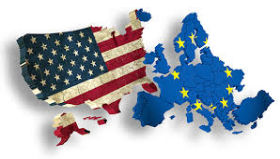EU – Baltic States, Russia, USA
International Internet Magazine. Baltic States news & analytics
Tuesday, 23.04.2024, 20:12
European leaders warn Trump about Putin's plans and the consequences of lifting sanctions
 Print version
Print version |
|---|
The newspaper writes that the prospect of President-elect Donald Trump striking a grand bargain with Russian President Vladimir Putin is unnerving to many traditional U.S. allies, but few stand to lose more than the pro-American leaders of countries in Central and Eastern Europe. Those leaders, fighting on the front line of the battle against Putin’s drive to upend the democratic world order, are asking Trump to think twice before choosing the wrong side.
''Putin does not seek American greatness. As your allies, we do,'' 17 current and former officials from a range of Central and Eastern European countries, including Latvia, wrote in a letter to Trump that the Washington Post obtained. “As your treaty-bound allies, we appeal to Americans in the new U.S. administration and Congress to stand firm in the defense of our common goals and interests: peace, Atlantic strength, and freedom.”
The European leaders wrote that they welcome Trump’s election and look forward to working with the new administration to bolster the transatlantic alliance. But if Trump decides to go the other way and join forces with Putin, they warn, there will be severe negative consequences for both Europe and the United States.
First of all, the Trump administration must not weaken sanctions on Russia or tacitly accept the Russian annexation of Crimea, the European leaders argued. Doing so would not only demoralize the pro-American forces in Ukraine, but would also destabilize the region economically and give comfort to extremist, anti-Western actors.
A grand bargain with Putin that throws Ukraine under the bus would have grave consequences for America’s broader standing in Europe as well, the leaders wrote.
“The aftershocks of such a deal would shake American credibility with allies in Europe and elsewhere,” the letter says. “The rules-based international order on which Western security has depended for decades would be weakened. The alliances that are the true source of American greatness would erode: countries that have expended blood, treasure and political capital in support of transatlantic security will wonder if America is now no longer a dependable friend.”
Overall, the European leaders argue that Putin cannot be an ally of the West and that Russian policies have made Europe a more dangerous place for all. Even if a deal is struck, Russia is likely to continue to undermine European democracies through a range of nefarious activities, including cyberattacks, energy and economic pressure, espionage, psychological warfare, disinformation and bribery.
Their plea to Trump is similar to an open letter that several Central and Eastern European leaders wrote to President Obama shortly after he took office in 2009. Those leaders warned that as Obama pursued a “reset” of U.S. relations with Russia, there was a risk that the European countries would lose faith in the United States and that the transatlantic relationship might be weakened, the newspaper points out.
During the Obama administration’s tenure, several Central and European countries have seen the ascension of far right, pro-Russian political actors and groups. Meanwhile, Russia’s active measures across the European continent have escalated, the Washington Post goes on to say.
“Central Europeans were proved right. They warned the Obama administration about the risks of engaging with Russia,” said Peter Doran, executive vice president of the Center for European Policy Analysis. “Now with the prospect of a new grand bargain with Russia, Central Europeans are warning the new American president not to make the same mistakes of his predecessors.”
There’s lots of evidence that the concerns of pro-American Europeans are justified. The Trump team seems intent on joining with Russia to fight terrorism in Syria, an idea that is fraught with problems. Trump himself has denigrated NATO, written off Crimea and praised Putin, the article emphasizes.
''But as the Trump team takes power and fills out its ranks, the hope is that calmer heads inside the new administration will argue forcefully for protecting the transatlantic relationship and standing by allies that have fought beside the United States for shared interests and values for decades. A grand bargain with Putin must not come at Europe’s expense,'' the article goes on to say.








 «The Baltic Course» Is Sold and Stays in Business!
«The Baltic Course» Is Sold and Stays in Business!

